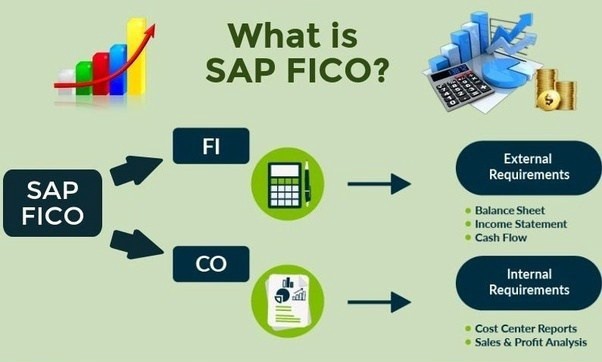
Introduction SAP FICO
SAP FICO, or Financial Accounting and Controlling, is a functional module of SAP ERP that helps businesses manage their financial and operational activities. It allows organizations to store, generate, and manage financial transaction data, and produce and manage financial statements for reporting and analysis. SAP FICO also helps organizations with business planning and decision-making.
- SAP FICO has two key components:
- General Ledger Accounting: Manages internal and customer transactions
- Bank Accounting: Allows users to create and process bank transactions
- Accounts Payable and Receivable: Manages customer and vendor transactions
Types of SAP modules
Primarily, two SAP modules comprise several sub-modules. The two modules are as below:

Functional modules
SAP offers various pre-defined functionalities to help businesses perform multiple operations. Functional modules provide standard functionality to simulate actual business activity. The functional SAP module primarily focuses on topics such as business intelligence, business objects, customer relationship management, finance management, sales, distribution and supply chain management.Here is a list of functional modules:
- SAP logistics execution (LE)
- SAP sales and distribution (SD)
- SAP financial supply chain management (FSCM)
- SAP controlling (CO)
- SAP materials management (MM)
- SAP quality management (QM)
- SAP financial accounting (FI)
- SAP plant maintenance (PM)
- SAP project system (PS)
- SAP production planning (PP)
- SAP human resources management (HRM)
Technical modules
Technical modules focus primarily on programming and module customisation using SAP. These SAP modules enable professionals to troubleshoot performance issues, schedule tasks, develop applications, download and install updates and manage and execute migrations. These technical modules include:
- SAP basis
- SAP security
- advanced business application programming (ABAP)
- high performance analytic appliance (SAP HANA)
- SAP NetWeaver
- information systems management (SAP IS)
- customer relationship management (SAP CRM)
- exchange infrastructure (SAP XI)
- SAP Solution Manager (SAP SM)
Benefits of a SAP course
SAP certification is becoming one of the most desirable domains of accreditation. SAP experts are in high demand worldwide because of their high level of knowledge, expertise and skills in the area. There are several advantages of this course.

Levels of a SAP course
SAP course offers certification at multiple levels, majorly focusing on particular topics. The four primary levels of SAP certification are:
Associate certification
This is the fundamental level of the certification. The associate certification covers the basic requirements for a SAP professional. If you wish to learn about SAP and earn higher certifications, you can start with this level. The exam duration of an associate-level certification is three hours and generally comprises eighty multiple-choice questions.
Delta certification
The delta certification builds upon the associate-level credentials. It releases features and updates every quarter. Assessment of the delta certification is based on the new features and enhancement releases for that quarter, and certified professionals require to be on the most recent release to meet new delta standards. The exam duration is ninety minutes and comprises forty questions. This exam intends to keep professionals updated with the latest SAP skills and information.
Specialist certification
The specialist certification focuses on a particular topic or integration component of SAP and provides professionals with very narrow and specific business skills. The specialist certification exam takes ninety minutes. Only a candidate who has successfully completed their associate certification exam can take this exam.
Professional certification
Professional certification is the most advanced level of SAP certification. It requires actual project experience, sound business knowledge, a detailed understanding of SAP solutions and advanced knowledge of SAP tools before the examination. Professional-level certification can empower you to earn more money and advance your career considerably.
SAP Course Duration
The duration of SAP courses directly depends on the type of course the candidate opted for. For example, a typical online SAP course on Udemy or Coursera can last anywhere from a week to a couple of months. An offline course on the other hand can last for around a year.
How SAP Brings about a Change in Career?
SAP certification is a program of choice for majority of IT professionals because it is required by almost every business across the globe, in every major industry. SAP certified individuals get better job offers, career growth and significance because of their knowledge to have SAP ERP to automate customer relations management, simplify finance management and so on.
With SAP products becoming predominantly used in the IT industry, almost every individual be it a business analyst, IT administrator, developer or team leader, every type of professional can boost their career when they obtain certification from a reputed institution. Additionally, the certification acquired can also lead to supporting job roles such as a consultant, trainer or to provide SAP ERP related solutions to customers.
The range of modules available within the program ensures there is something for everyone, so that be it an IT professional or a person who has recently completed a postgraduate degree can pick their choice to specialize in that particular module.
Roles of SAP professionals in different fields
Professionals with SAP certification can work efficiently in the following domains:
- Human resources: managing employment contracts, salary and payroll, hiring, promotions, personnel administration and recruitment
- Customer relationship management: cultivating long-term lucrative partnerships, developing innovative solutions for improved customer experiences, ensuring consistency across branches and increasing customer value
- Sales and distribution: managing to-do lists, order information, delivery, costing, billing, credit processes, freight forwarding and customer support
- Business intelligence: extracting, compiling, analysing and reporting data from multiple sources, handling data storage, and delivering reports in various formats, such as graphs, grids, maps and charts using business explorer tools
Job opportunities after SAP course
Candidates with SAP certification have many available job opportunities in a wide range of areas. The following are some job opportunities after the SAP course:
- SAP consultant
- SAP ABAP consultant
- SAP FICO consultant
- SAP SD consultant
- SAP ABAP developer
- SAP basis administrator
- SAP project manager
- SAP hana architect
- sales manager
- solution development consultant
- business process analyst
- pre-sales consultant
- senior software engineer
- implementation consultant
- SAP procurement specialist
- SAP trainer
- system engineer
- SAP basis consultant

